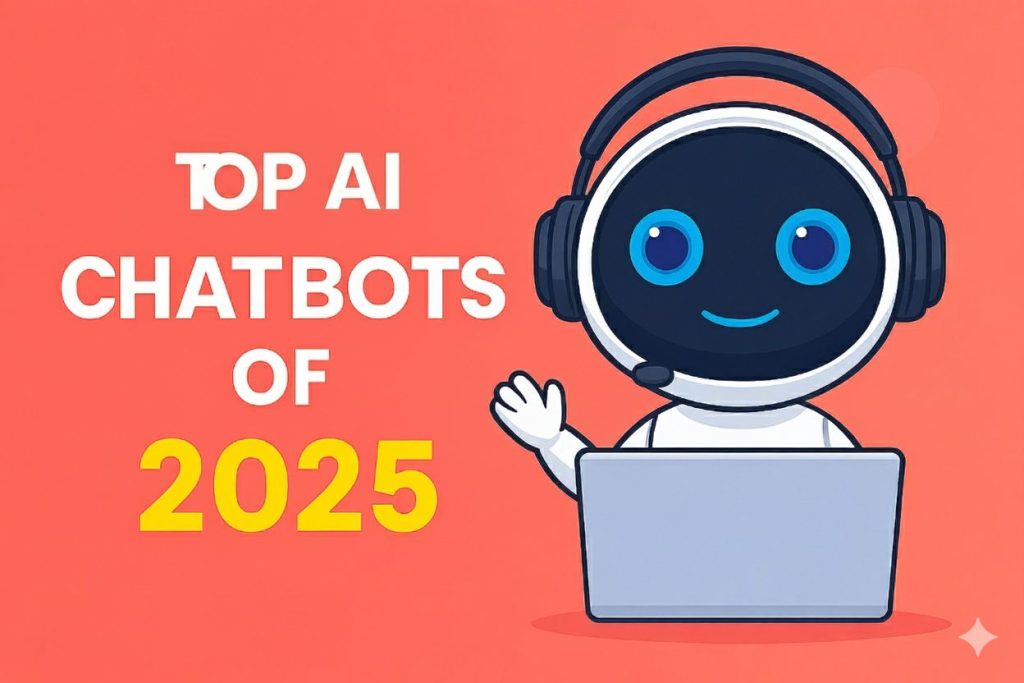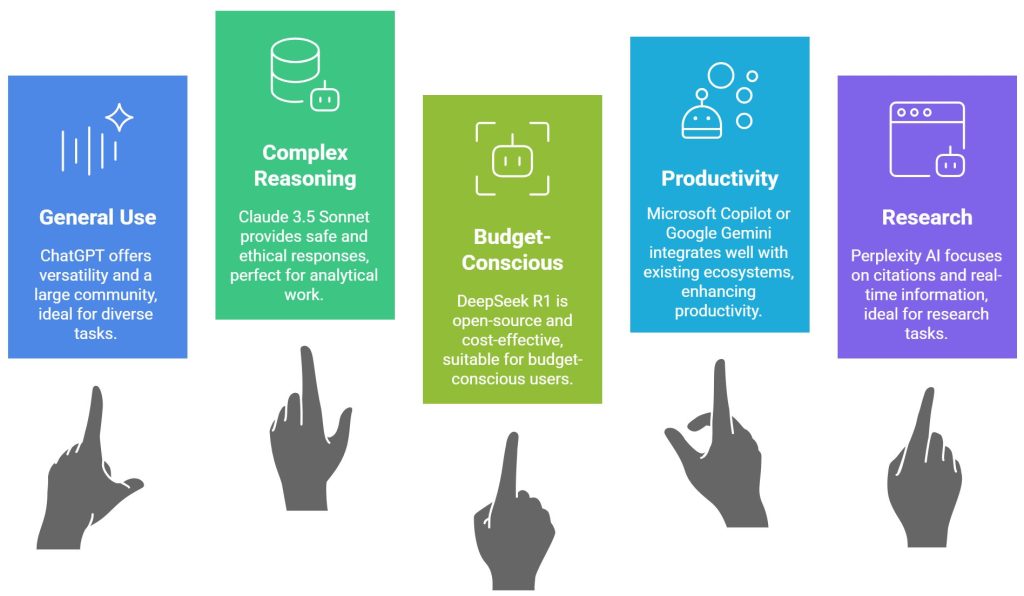
Last Updated: September 2025
The artificial intelligence landscape has undergone a dramatic transformation in 2025, with AI chatbots becoming more sophisticated, specialized, and capable than ever before. ChatGPT continues to dominate the chatbot space with over 46.5 billion visits in 2025, representing 48.36% of the total chatbot market traffic, but the competition has intensified significantly with the emergence of new reasoning models and specialized platforms.
This comprehensive guide explores the most advanced AI chatbots available in 2025, analyzing their unique capabilities, pricing models, and ideal use cases to help you make an informed decision.
The Current AI Chatbot Landscape in 2025
The artificial intelligence landscape has shifted dramatically in early 2025. What once seemed like a two-horse race between OpenAI and Anthropic has evolved into a three-dimensional chess match with multiple powerful players competing for dominance. One of the biggest leaps in AI chatbots recently was the release of reasoning models, like OpenAI o3 and DeepSeek R1, which have revolutionized how AI systems approach complex problem-solving tasks.
Top AI Chatbots of 2025
1. ChatGPT (GPT-4o and o3 Models) – The Market Leader
Developer: OpenAI
Key Models: GPT-4o, o3-mini, o3 (reasoning model)
Pricing: Free tier available, Plus ($20/month), Pro ($200/month)
Best For: General conversation, content creation, coding, research
ChatGPT remains the undisputed leader in the AI chatbot market, maintaining its position through continuous innovation and model improvements. The platform has evolved significantly with the introduction of reasoning models that can think through complex problems step-by-step.
Key Features:
- Advanced reasoning capabilities with o3 models
- Multimodal support (text, images, voice)
- Custom GPT creation for specialized tasks
- Integration with DALL-E for image generation
- Code interpreter for data analysis
- Real-time web browsing (Plus subscribers)
Strengths:
- Most comprehensive feature set
- Largest user base and community
- Continuous model updates and improvements
- Excellent performance across diverse tasks
- Strong API ecosystem
Limitations:
- Can be expensive for heavy usage
- Occasional hallucinations in complex reasoning
- Limited free tier usage
2. Claude 3.7 Sonnet – The Reasoning Powerhouse
Developer: Anthropic
Key Model: Claude 3.7 Sonnet (hybrid reasoning model)
Pricing: Free tier, Pro ($20/month), Team ($25/month per user)
Best For: Complex reasoning, coding, analysis, ethical AI interactions
Claude 3.7 Sonnet is the most intelligent model to date and the first hybrid reasoning model generally available on the market. Anthropic has positioned Claude as the ethical alternative with superior reasoning capabilities.
Key Features:
- Hybrid reasoning architecture combining fast and deep thinking
- 200K token context window
- Superior code generation and debugging
- Strong ethical guidelines and safety measures
- PDF and document analysis
- Vision capabilities for image analysis
Strengths:
- Exceptional reasoning and problem-solving
- Strong ethical framework prevents harmful outputs
- Excellent for complex analytical tasks
- Superior code quality and debugging assistance
- Transparent about limitations and uncertainties
Limitations:
- More expensive than some alternatives
- Conservative approach may limit creative outputs
- Smaller user base compared to ChatGPT
3. DeepSeek R1 – The Open Source Revolutionary
Developer: DeepSeek
Key Model: DeepSeek R1 (reasoning model)
Pricing: Free and open source
Best For: Mathematical reasoning, scientific tasks, cost-effective AI solutions
DeepSeek R1 is an advanced reasoning-focused, open source, LLM designed to revolutionize reasoning capabilities in AI systems. It introduces a novel approach to training LLMs, leveraging reinforcement learning (RL) as its cornerstone.
Key Features:
- Open source and free to use
- Advanced mathematical and scientific reasoning
- Efficient sparse architecture
- Strong performance on coding benchmarks
- Transparent model architecture and training data
Strengths:
- Completely free and open source
- Excellent mathematical reasoning capabilities
- Transparent development process
- Cost-effective for businesses
- Strong community support
Limitations:
- DeepSeek’s mentions dropped by over 88% after initial peak
- Limited multimodal capabilities
- Requires technical expertise for optimal deployment
- Less refined user interface compared to commercial alternatives
4. Google Gemini (Gemini 2.0 Pro) – The Integration Champion
Developer: Google
Key Models: Gemini 2.0 Pro, Gemini Advanced
Pricing: Free tier, Gemini Advanced ($20/month)
Best For: Google Workspace integration, multimodal tasks, research
Google’s Gemini has evolved into a powerful multimodal AI assistant with deep integration into Google’s ecosystem of services.
Key Features:
- Native integration with Google Workspace (Gmail, Docs, Sheets)
- Advanced multimodal capabilities (text, images, video, audio)
- Real-time information through Google Search
- Code generation and execution
- YouTube video analysis and summarization
Strengths:
- Seamless Google ecosystem integration
- Strong multimodal performance
- Real-time access to current information
- Excellent for productivity workflows
- Competitive pricing
Limitations:
- Has experienced some decline in market share this year
- Limited third-party integrations outside Google ecosystem
- Privacy concerns for some users
5. Microsoft Copilot – The Productivity Specialist
Developer: Microsoft
Key Models: GPT-4 Turbo integration
Pricing: Free tier, Copilot Pro ($20/month)
Best For: Microsoft Office integration, productivity, enterprise workflows
Microsoft Copilot has become the go-to AI assistant for productivity and enterprise applications, with deep integration across Microsoft’s software suite.
Key Features:
- Deep Microsoft 365 integration
- Code assistance in Visual Studio
- DALL-E image generation
- Real-time web search through Bing
- Enterprise security and compliance features
Strengths:
- Excellent Microsoft ecosystem integration
- Strong enterprise features and security
- Competitive pricing structure
- Good performance across productivity tasks
- Regular updates and improvements
Limitations:
- Limited functionality outside Microsoft ecosystem
- Less advanced reasoning compared to specialized models
- Occasional integration issues with older Office versions
6. Perplexity AI – The Research Specialist
Developer: Perplexity AI
Key Models: pplx-7b-online, pplx-70b-online
Pricing: Free tier, Pro ($20/month)
Best For: Research, fact-checking, real-time information
Perplexity AI released two LLMs of their own, pplx-7b-online and pplx-70b-online – which have 7 and 70 billion parameters respectively, positioning itself as the premier research-focused AI chatbot.
Key Features:
- Real-time web search integration
- Source citations for all responses
- Academic and research focus
- Fact-checking capabilities
- Clean, distraction-free interface
Strengths:
- Excellent for research and fact-checking
- Always provides source citations
- Real-time information access
- Academic-quality responses
- Clean user interface
Limitations:
- Limited creative writing capabilities
- Smaller model size compared to competitors
- Less conversational than other chatbots
- Focused primarily on information retrieval
7. Grok (xAI) – The Uncensored Alternative
Developer: xAI (Elon Musk)
Key Model: Grok-3
Pricing: X Premium+ subscription ($16/month)
Best For: Uncensored conversations, real-time social media insights, creative tasks
Grok demonstrated steady, upward trends in media visibility and has carved out a niche as the less restricted AI chatbot option.
Key Features:
- Real-time X (Twitter) data access
- Less restrictive content policies
- Humor and personality in responses
- Integration with X platform
- Regular model updates
Strengths:
- More relaxed content restrictions
- Real-time social media insights
- Engaging personality and humor
- Growing user base and visibility
- Regular improvements and updates
Limitations:
- Requires X Premium+ subscription
- Limited integration outside X ecosystem
- Sometimes lacks accuracy in favor of entertainment
- Smaller model compared to market leaders
Specialized AI Chatbots Worth Considering
Character.AI – For Creative Roleplay
- Best For: Creative writing, character interactions, entertainment
- Key Feature: Create and interact with custom AI characters
- Pricing: Free tier, Plus ($9.99/month)
Replika – For Emotional Support
- Best For: Personal companion, emotional support, casual conversation
- Key Feature: Personalized AI companion that learns your personality
- Pricing: Free tier, Pro ($19.99/month)
Jasper Chat – For Marketing Content
- Best For: Marketing copy, business content, brand-specific writing
- Key Feature: Templates optimized for marketing and business use
- Pricing: Creator ($49/month), Teams ($125/month)
Choosing the Right AI Chatbot for Your Needs

For General Use and Versatility
Recommendation: ChatGPT
ChatGPT offers the most comprehensive feature set and largest community, making it ideal for users who need a versatile AI assistant for various tasks.
For Complex Reasoning and Analysis
Recommendation: Claude 3.7 Sonnet
Claude 3.5 Sonnet focuses on generating safe and ethical responses while maintaining high performance in coding tasks, making it perfect for analytical work.
For Budget-Conscious Users
Recommendation: DeepSeek R1
The open-source nature and strong performance make DeepSeek R1 an excellent choice for users and businesses looking for cost-effective AI solutions.
For Productivity and Work
Recommendation: Microsoft Copilot or Google Gemini
Choose based on your existing ecosystem – Copilot for Microsoft users, Gemini for Google Workspace users.
For Research and Fact-Checking
Recommendation: Perplexity AI
Its focus on citations and real-time information makes it ideal for academic and professional research tasks.
The Future of AI Chatbots in 2025 and Beyond
The AI chatbot landscape continues to evolve rapidly with several key trends emerging:
- Reasoning Models Becoming Standard – One of the biggest leaps in AI chatbots recently was the release of reasoning models, and we expect this capability to become standard across all major platforms.
- Increased Specialization – We’re seeing more chatbots designed for specific industries and use cases, rather than general-purpose solutions.
- Multimodal Integration – The ability to process text, images, audio, and video simultaneously is becoming a baseline requirement.
- Enterprise Focus – More emphasis on security, compliance, and integration with existing business workflows.
- Open Source Alternatives – The success of models like DeepSeek R1 is driving more open-source development, providing alternatives to commercial solutions.
Pricing Comparison and Value Analysis
| Platform | Free Tier | Paid Plans | Best Value |
|---|---|---|---|
| ChatGPT | Limited | $20-$200/month | Plus plan for most users |
| Claude | Yes | $20-$25/month | Pro plan offers good balance |
| DeepSeek R1 | Full access | Free | Best overall value |
| Gemini | Yes | $20/month | Good for Google users |
| Copilot | Limited | $20/month | Excellent for Office users |
| Perplexity | Yes | $20/month | Great for researchers |
| Grok | No | $16/month | Limited to X users |
Security and Privacy Considerations
When choosing an AI chatbot, consider these important factors:
Data Privacy
- How is your conversation data stored and used?
- Can you delete your data?
- Is data used for model training?
Enterprise Security
- GDPR and compliance certifications
- Data encryption and security measures
- Admin controls and user management
Content Filtering
- How does the platform handle inappropriate content?
- What are the content policy restrictions?
- Can you customize safety settings?
Performance Benchmarks
Based on recent evaluations:
Coding Performance
- Claude 3.7 Sonnet – Exceptional code quality and debugging
- ChatGPT (o3) – Strong overall coding capabilities
- DeepSeek R1 – Excellent for mathematical programming
Reasoning Tasks
- Claude 3.7 Sonnet – Superior analytical reasoning
- OpenAI o3 – Strong step-by-step problem solving
- DeepSeek R1 – Excellent mathematical reasoning
Creative Writing
- ChatGPT – Most versatile creative output
- Claude – High-quality, ethical creative content
- Grok – Entertaining and unrestricted creativity
Research and Fact-Checking
- Perplexity AI – Best citation and source integration
- Gemini – Strong real-time information access
- ChatGPT – Good general research capabilities
Conclusion
The AI chatbot landscape in 2025 offers unprecedented choice and capability. The AI landscape of 2025 is unrecognizable from just a few years ago, with each platform offering unique strengths and specializations.
For most users, ChatGPT remains the best overall choice due to its comprehensive features and continuous improvements. However, specialized needs may be better served by focused platforms like Claude for reasoning, Perplexity for research, or DeepSeek R1 for cost-effective solutions.
The key is to understand your specific requirements and choose the platform that aligns best with your workflow, budget, and use cases. As these technologies continue to evolve rapidly, staying informed about new developments and regularly evaluating your chosen platform will ensure you’re leveraging the best AI capabilities available.
The future of AI chatbots looks incredibly promising, with reasoning capabilities, multimodal integration, and specialized applications continuing to push the boundaries of what’s possible in human-AI interaction.
